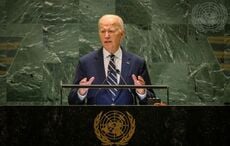Trump appointed Commerce Secretary Wilbur Ross has been accused of engaging in insider trading whilst a shareholder and board member of Bank of Ireland.
A report presented to the European Parliament by Luke 'Ming' Flanagan, member of the European Parliament for Ireland's Midlands-North-West, says that Ross knew that the bank’s published accounts were deceptive. Yet, he stayed quiet and sold his shares in 2014 at the top of the market.
The report alleges:
In 2011 Bank of Ireland admitted that it allowed US investor Wilbur Ross and other major funds to carry out due diligence on its assets. Mr Ross therefore had access to the loss details that Bank of Ireland kept hidden from retail shareholders. Between 2011 and 2014 Mr Ross is reported to have made Euro 477 million from the purchase and sale of Bank of Ireland shares. Retail shareholders were denied this opportunity, which suggests that they were oppressed, or in plain English, the profit that Mr Ross accumulated was largely at their expense.
It concludes:
Mr Ross appears to have been aware of the flawed accounting model as used by Bank of Ireland. In January 2016, his name was mentioned in a court case. Ocwen, a US financial corporation was investigated by the Securities and Exchange Council. Like Bank of Ireland it used a variant of the flaw in IAS 39 to hide losses.
Had Ross known about Bank of Ireland’s flawed accounting practices he would have been obliged to disclose what he knew to the public before he sold his shares.
Read More: Billionaire Wilbur Ross backs Ireland to become ‘Silicon Valley’ of Europe
Not long after Bank of Ireland was bailed out during the Great Recession, Ross paid $1.32 billion for his shares in 2011; each was valued at $0.12 at the time of purchase but most of them were sold three years later for $0.39 each, the remainder were then disposed of at 0.31. It was a profit that the Irish Independent described as a “ huge killing.”
The following year the Bank admitted its accounting practices were flawed and share prices tumbled.
Earlier this year Forbes removed Ross from their rich list after his financial-disclosures to Congress revealed he owned $700 million in assets – they were under the impression he was a multi-billionaire.
Read More: Trump White House to investigate Ireland’s “unfair” trade practices
"It seems clear that Ross lied to us, the latest in an apparent sequence of fibs, exaggerations, omissions, fabrications and whoppers that have been going on with Forbes since 2004," the publication concluded.
In a statement to IrishCentral, Wilbur Ross categorically rejected the reports allegations:
The Mother Jones article about Bank of Ireland is a factually incorrect effort to smear me. The report they reference was commissioned by a single member of the European United Left-Nordic Green Left, whose original member parties included the French, Italian, Portuguese and Greek communist parties. Here are the facts:
The shares purchased by WL Ross Funds, and also by Fidelity Funds, Capital Research, Fairfax, and Kennedy Wilson, were the unsubscribed portion of a rights offering made available to the Irish Government and public shareholders on the preferential terms.
We bought them at the same price they were offered to those other public shareholders. The government at the time had designated a majority of the Board of Directors and was the largest shareholder. The investment bankers appointed by the government were world class firms and it was their obligation to assure proper dissemination of all material information.
The report’s author implausibly says that I learned of what he calls improper accounting during the due diligence and used that information to get a cheap price. This is an obvious non-sequitur, given the process described above.
The Bank’s basic accounting used IAS39, as required by the regulators, and was reviewed by PwC, the Bank’s outside auditors. The Bank’s financial statements were reviewed in excruciating detail by the Irish regulators, the ECB, the SSM, and the IMF.
The Bank also issued a variety of securities at different points during WL Ross Funds’ ownership. Due diligence was performed in each case by the investment bankers and the purchasing institutions. They clearly found nothing wrong.
When we sold the last block of WL Ross Funds’ holdings, other investors such as Fairfax, which had representation on the Board, decided not to join in the sale. The stock subsequently traded at a much higher price.
The report incorrectly says that there were official confessions of improper accounting in May 2015 after the final sale. In fact, the Bank reported earnings for 2015 of 947 million euros, 161 million euros more than in 2014, when WL Ross Funds sold the shares. Earnings in 2016 also were higher than in 2014.
If there actually had been a confession of accounting wrongdoing in 2015, it would have had to be reflected in the financials.
The report also brings in the Ocwen litigation, an irrelevance at best. That case was settled at no cost to me and I never even was called to appear in court. It clearly was mentioned as a smear to imply that I had done something wrong—this is simply not the case.




Comments